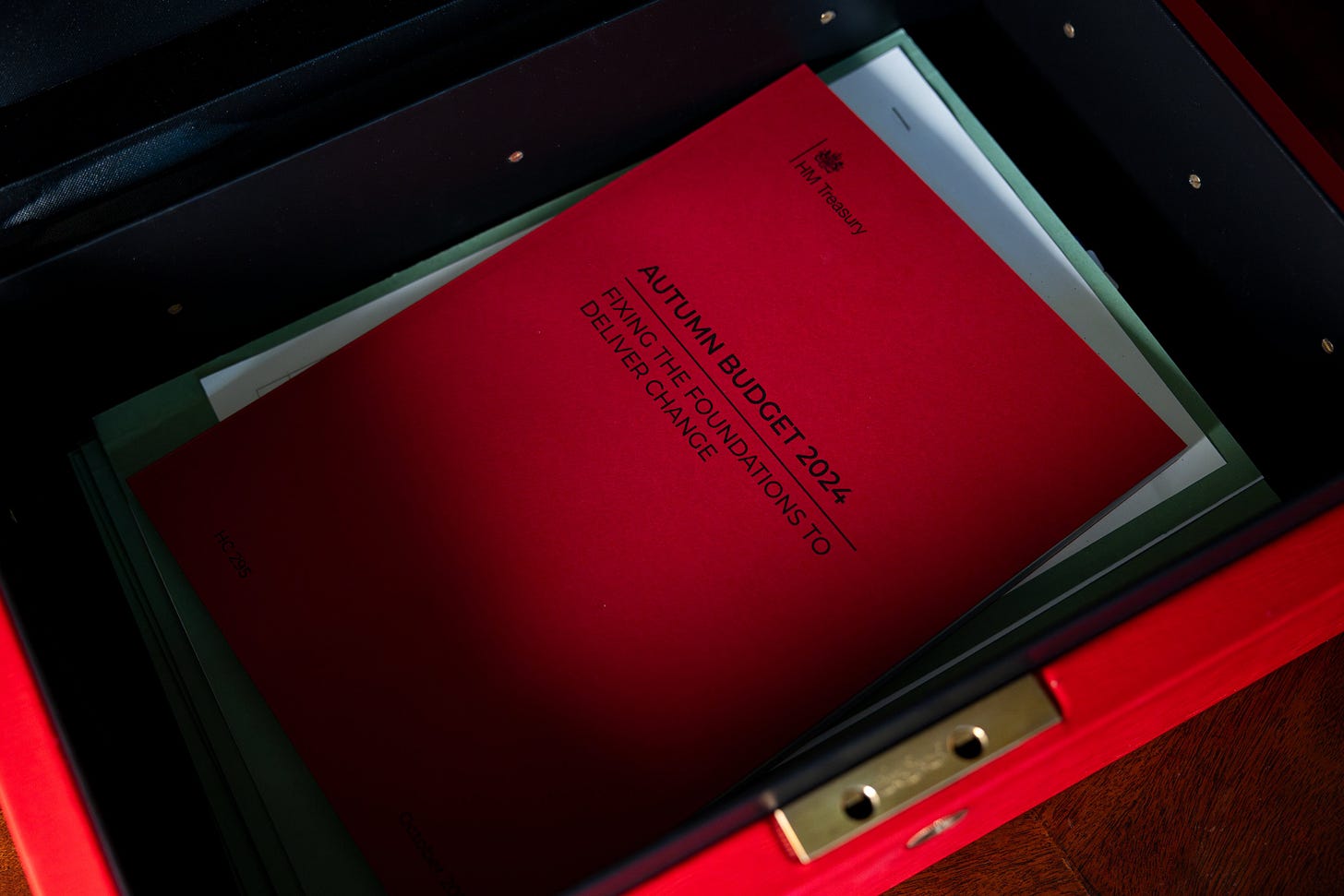Budget 2024 in brief
Short and sharp overview of the autumn budget 🎃
In case you had better things to do than watch the entirety of the budget – responsibilities, too, like work (it’s only a Wednesday, after all), we have spent the afternoon getting our head around everything that was announced (and through a pretty chunky paper, too). Here’s a short guide to some of the key points outlined in today’s budget, with initial responses, too. When you’ve caught up, we’d love to get your take on it.
Topline
The budget will raise taxes by £40 billion.
The chancellor, Rachel Reeves, said: “The only way to improve living standards, and the only way to drive economic growth is to invest, invest, invest.”
It’s the biggest tax-raising budget since 1993 when the Conservatives were in government (which would have been equivalent to £33 billion today).
“Big taxes, big borrowing and big spending,” as the BBC’s political editor, Chris Mason, put it.
The economy is expected to grow … very modestly
The Office of Budget Responsibility forecasts a 1.1% growth for 2024, 2% for 2025 and 1.8% for 2026.
Inflation is expected to hover around 2.5% for the remainder of 2024, increase to 2.5% next year and drop to 2.3% in 2026.
National insurance is going up for employers and not employees
It will go up to 15% (currently 13.8%). The threshold for when employers start paying national insurance contributions will be reduced from £9,100 to £5,000.
Alongside that, the employment allowance will increase to £10,500. It’s currently £5,000.
The national living wage is going up
The national living wage will increase to £12.21 from £11.44, a 6.7% rise. Over a year workers can expect to take home an extra £1,400.
The national minimum wage will go up to £10, an increase of 16.3%.
The long-term goal is to “create a single adult wage rate … eventually giving [all workers] the same wage for the same day’s work”.
Affordable housing boost
The Affordable Homes Programme will benefit from an extra £500 million in funding. The goal is to build 5,000 more affordable homes.
“We strongly welcome the £500m top-up to the affordable homes programme,” said Kate Henderson, chief executive of the National Housing Federation.
“This vital injection of funding, which we’ve been urgently calling for, will support housing associations to continue to deliver much-needed affordable homes in the immediate term and prevent a collapse in delivery.”
Encouraging school rebuilds and hiring more teachers
Resource spending on the education system will increase by 3.5%, equivalent to £11.2 billion.
Part of the £2.3 billion boost to the core schools budget will be earmarked for hiring more teachers – specifically 6,500 of them.
Sorting out the NHS
The Department for Health and Social Care will get an extra £22.6 billion in resource spending, which is expected to help deliver an extra 40,000 elective appointments a week.
The government also said that it is committed to continuing with the delivery of the New Hospital Programme – prioritising RAAC-affected buildings – but “on a more sustainable and deliverable footing”.
Filling those potholes
There will be close to a 50% increase in funding for fixing up roads, totalling some £500 million.
Bus fares are expected to go up, with the £2 cap on fares being swapped for a higher cap of £3.
To get more people walking and cycling, an additional £100 million is being assigned to local authorities to improve paths and cycling infrastructure.
Initial responses
“[This is a] budget that contains broken promise after broken promise and reveals the simple truth that the prime minister and the chancellor have not been straight with the British people …
Today’s budget sees the fiscal rules fiddled, borrowing increased by billions of pounds, inflation-busting handouts for the trade unions.”
– Rishi Sunak, former prime minister and outgoing leader of the Conservative Party
“It does bear repeating that the fiscal inheritance is truly dire. The spending plans inherited from the last government were never likely to survive contact with a Spending Review. Tax rises were always a near-inevitability.
“The new government’s embrace of fiscal reality is commendable – and would have been even more so had it occurred during the election campaign, and not only after the fact.”
– Paul Johnson, director of the Institute for Fiscal Studies
“Today the chancellor has made some wise calls and shown a new positive course for our country. The important increases to public investment paired with changes to make the tax system fairer are much needed to benefit people in every corner of the country.
“A boost to local government finances over the coming years is reassuring, but councils will need longer term commitments in the future, including multi-year settlements.”
– Zoë Billingham, director of IPPR North
“By hammering the private sector, she [Rachel Reeves] has delivered a budget which – as the Office for Budget Responsibility’s own figures show – will reduce business investment, trade and private sector activity, propping up the economy via higher state spending.
– Robert Colville, director of the Centre for Policy Studies



